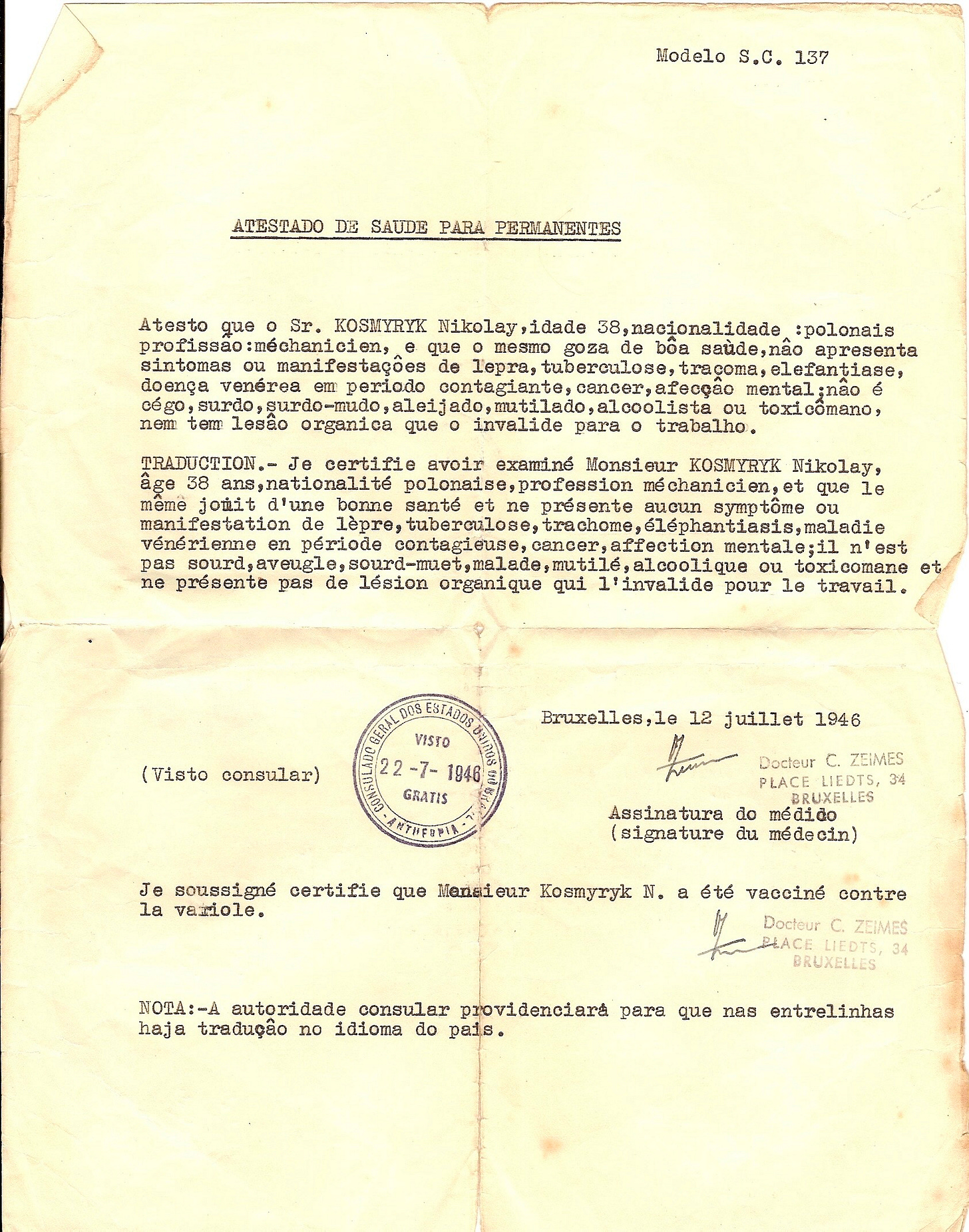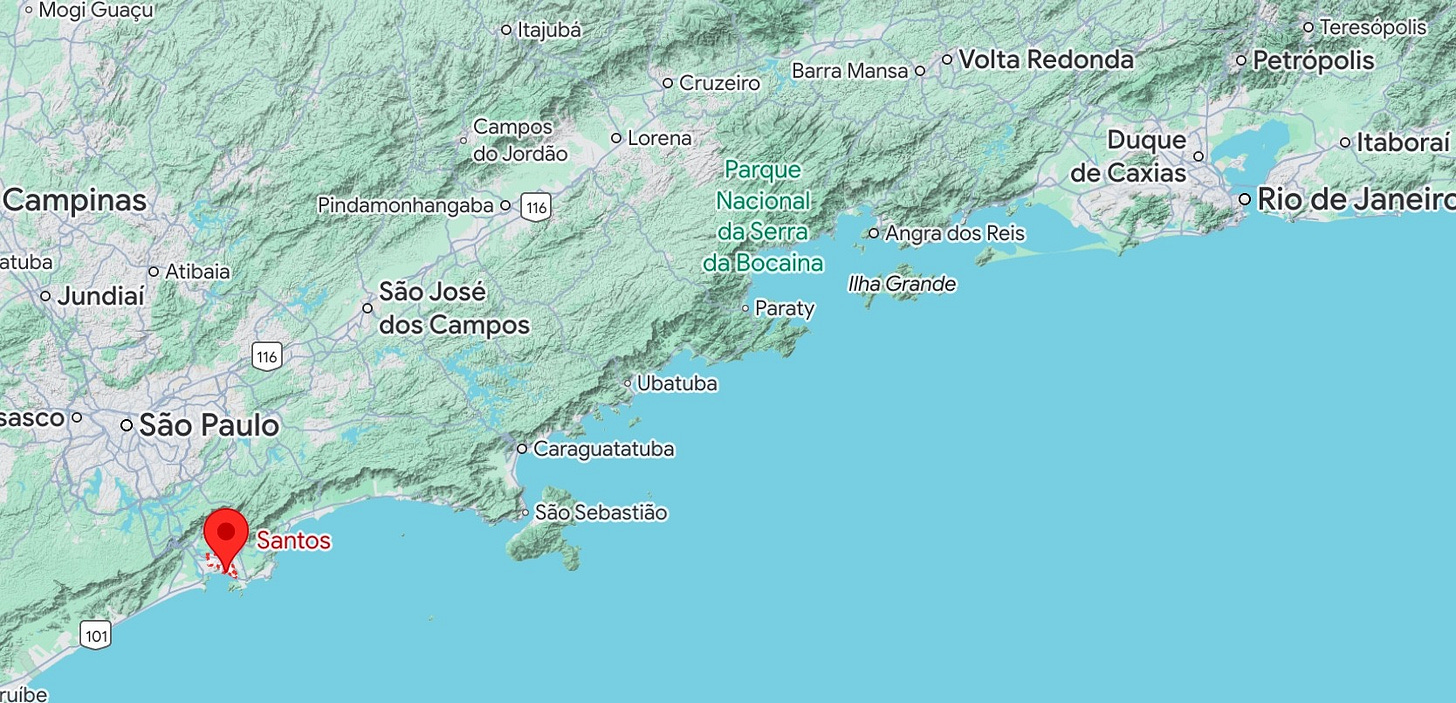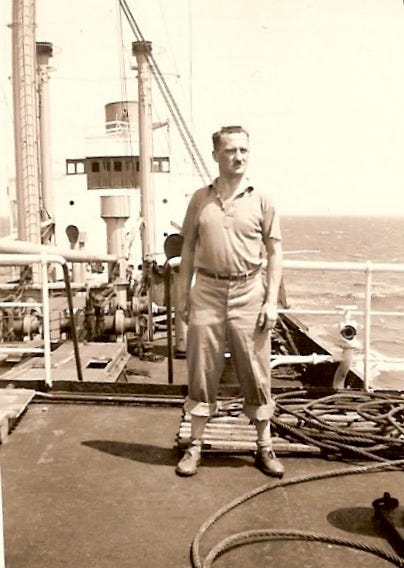The Brazilian Story
My father's attempt at emigration after WWII: he went to Brazil and he came back to Belgium.
This story was originally written for my blog in 2006. It should have been simple to update, but as always, what seems simple usually isn’t. But because of later developments I have added some more information, and checked the dates. In the middle of checking information and dates I began to have some doubts about what was really going on.
I tried to confirm something with my sister, and we decided we needed to do a check of the letters between my father and mother in that period. So over Christmas I started a list of them, about this period, before he came to England and they got married. Rereading them, in French, made me realise how much they wanted to meet and get married, despite all the legal difficulties that existed at the time for refugees to get work and women to keep their nationality if they married foreigners.
Why Brazil?
The reason my father went to Brazil is not clear. In his Polish “passport” for 19461, he is not allowed to travel to Poland, only to Brazil or Palestine, (meaning what was to become Israel in 1948).
As mentioned in the last post, my father never showed any signs of being Jewish. Emigration for Zionist Jews after the war meant to go to Palestine. It was still under the British Mandate, until late 1947, as the British were losing over control over increasingly violent conflicts between the immigrant Zionist Jews and the Palestinian Arabs. I guess, but never asked, that my parents did not believe this was the place to set up home after WW II. For non-Zionist Jews, preferred destinations were to follow relatives who had earlier emigrated, or to join the Eastern European Displaced Persons from the camps, competing for emigration quotas. It was not entirely clear why he could not stay in Belgium as he had lived there before the war, with a good job.
As mentioned in the last post, my father never showed any signs of being Jewish at all, and was without any identifiable relatives in safe countries. By 1946/7 quotas for DPs were already filled for the most desirable countries. Immigrants from the Baltic States were preferred, as they had organised themselves into democratic self-governing groups, and were able to lobby the UN and their own immigrant groups in the US, Canada and Australia to provide opportunities.2
Preparing to get married
They were already preparing documents to get married. To prove she was single, my mother swore an affidavit in English with a local solicitor, so perhaps they were planning to marry abroad. Later she told us that my father had provided a certificate, also saying he was single, and free of TB, smallpox, and venereal disease. We had a good laugh at the time, but later we were astounded that this document actually appeared amongst his papers, after he died. The fact that it was in Portuguese (with a French translation) confused us, but the date shows it was probably also part of his papers to get a visa for Brazil. Here it is:
It is a fairly long list of illnesses he didn’t suffer from: leprosy, TB, trachoma, elephantiasis, venereal disease in an infectious state, cancer, mental illness; and he is not deaf, blind, deaf-mute, sick, mutilated3, alcoholic or drug addict. The last paragraph confirms he has been vaccinated against smallpox. It must have been amusing to my mother, a nurse.
Emigration
It seems a passage to Brazil was provided for him by the American (Jewish) Joint Distribution Committee of Brussels but finding a ship was quite hard, (as his letters to my mother show) with several delays and reroutings via Bordeaux and even Genoa, before eventual success.
He was granted extensions to his visa by the Brazilian consul in Antwerp although emigration to Brazil had already stopped, but he finally embarked in February 1947, hoping to start a new life.
When did he actually go to Brazil?
While writing this, I remembered there was a document on Ancestry. labelled as an immigration document dated 28 October 1946. If that was the case, then he was in Brazil at the time of my conception, and he couldn’t be my father. For several days, I felt I had found yet another family secret. Writing my family history is certainly a roller-coaster ride.
But my sister pointed out that although it is labelled “Immigration Card”, it was likely just a visa from the Brazilian Consul in Antwerp, and we needed to track the dates more carefully. She reassured me:
Mum always wanted children. She had to give up midwifery because it upset her too much delivering other people's babies. Imagine how envious she must have been when her younger sister Olive beat her to it! She did everything she could to keep you and get her man!
From her researches4,
The first Brazil visa stamp 697 from Antwerp Brazilian Consulate is dated 22 July 1946 valid for 90 days. Then he met Mum as her passport shows her in Belgium in July 1946.
Next visa 1197 dated 28 October 1946 replaces no 697 valid for 90 days. This ties up with the document shown above.
Then visa 55 issued 16 January 1947 replaces no 1197.
Dollars drawn from Nat Belgian Bank on 30 January 1947. Passport control leaving Antwerp 1-2-1947.
Arrives Rio 20-2-47.
Off to Brazil finally
He seems to have been quite excited about going, but sorry to be separated from my mother.
His voyage on the SS Alphard from Rotterdam was good.
His letters (in French, translation by me) to my mother say:
I am writing today some words for the first time about this beautiful and marvellous country, Brazil, of eternal spring and about Sao Paulo, a very large industrial town where I arrived with a 13 hour train journey since I arrived on 20 February. The voyage took 18 days. I wasn’t sea sick and the food was excellent on the Alphard. We were treated like princes.
Thank you for the letter to Antwerp and the telegram which met me on arrival in Rio.
When I arrived in Sao Paulo I was met at the station by the “Comite du Joint”5, who were very nice and provided food and accommodation for me. They met the expenses for the Identity Card so they could find me work. The climate is better than in Rio.
In Brazil
From stamps in his passport we can see that he arrived first in Sao Paulo, (stamp 26/02/1947), then moved to Rio, (20/03/1947) and then to Santos (18/05/1947). The last stamp in the passport is 16/06/1947.
According to stamps in his passport, it seems he arrived in Sao Paulo but moved to Rio and then Santos, a town to which Jewish immigrants were sent, to stay in Pensao Brickman.
There was no problem at first. He managed to get a work permit and permanent resident status, since these documents survive. In fact it is from these documents that we learnt that his parents were called Michail Kosmyryk and Helene Estermann.
I even found a blog post about the hotel here, which explains that it was a time when ships with Jewish immigrants regularly arrived. At the boarding house, (Pensao Brickman) and later the hotel (Hotel Brickman) young men and women ended up meeting, getting to know each other. Everyone, at that time, knew about the pension, it became a reference, especially for the Jewish community. And again, they were "arrival points" for those who arrived after the Second World War, or before that, as immigrants. There were even people coming from Bessarabia, the blog post mentions.
But all was not well, and we found this letter among my father’s papers.
A Facebook page “Genealogical Translations” provided the following translation:
Brickmann Pension
Santos, April 15, 1947
Most Illustrious Sir, Dr. Moysés Zbansky
By means of this letter, I present to you Mr. Nicolas, recently arrived in Brazil and sent by the Israelite Organizations of São Paulo for a two-week stay in our home. Since he is dealing with a nervous system disease, he should have stayed in our city for several months. However, since you are certainly aware of the shortcomings of our Organizations, they only helped you for 2 weeks here at the boarding house. He is able to give you all the necessary information, and I believe that there is no one better than you to help the aforementioned gentleman with more comprehensive advice, as I have been there for a few weeks.
Thanking you in advance, I greet you.
Zeno H. Tenburg, Manager
Leaving Brazil
But by June 1947 this was the story, and no letters survive from the intervening period.
Card 17 June Santos Thanks for your letter of 6 May. I am on the Belgian boat Kapitain Praef bound for Belgium.
The exit stamp in his passport is 16 June. It was a working package, and he got a good reference from the captain afterwards.
RETURN
So what happened to change his mind and make him return?
One answer has always been that my mother was pregnant. But this never seemed sufficient since, it was assumed that she would follow him and they had already planned to get married. Nevertheless there always remained some doubt in my mother’s mind (and mine as I grew up) that he might have preferred to travel round the world, rather than get married and settle down in England.
But two short (undated) letters from a doctor in Sao Paulo show that all was not well.
The first says he is not fit for work on account of the climate, and the other is a character reference to recommend him to friends for work. The letters are on headed notepaper from a psychiatrist at the Hospital de Juquieri, Sao Paulo. This hospital was notorious for housing the (ordinarily) insane with the criminally insane.6
Another answer from my mother was that the climate did not agree with him and he did not like living on beans, which seemed to be the staple food on offer.
Back in Brussels
If one assumes he only went to Brazil because he had no choice, and his Polish passport expired on 27 June 1947, he made it back to Belgium just in time. The Belgian authorities clearly let him in, but what identity document did he have after that? We have only his work permit stamped 10 October 1947, and another work document allowing him to work as a welder in a firm during 1948.
And how did my mother persuade the British authorities to let my father in? The correspondence does not survive which is odd, as both parents kept a lot of documents.
However, the British wanted to recognise the contribution the Polish Armed Forces in the West had made to the war effort, and that the Poles did not generally wish to go home after Stalin’s communist takeover in Poland. So, Britain approved the Polish Resettlement Act 1947, Britain's first mass immigration law, allowing Poles to come to live and work in the UK.7 This meant my father could get a visa, and was eligible to work in the general labour shortage after the war.
So legal changes after the war benefitted both my parents: my mother allowing her to keep her nationality while marrying a foreigner, and my father, to immigrate and find work.












Gosh, Helene, I'm so sorry I missed this one when you released it on Substack in January. What an extraordinary story leaving me now with so much curiosity about those post-WWII migrations. I heard so little from my own parents, neither of whom had a direct role in the war.
So many questions were left unasked. 🥺
I often find that if I rewrite something written before that I find things to question and gaps to fill. It is never a simple cut and paste. You are so fortunate to have all those documents to work with.